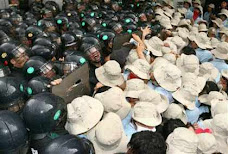 September-October 2008 IMPACT
September-October 2008 IMPACT
Protecting Civilians in the Georgia Conflict
Moving Congress to Prosecute Recruiters of Child Soldiers
Pressing South Africa on its Treatment of Zimbabweans
Pressuring Burma through Targeted Sanctions
Jordan should end routine and widespread torture in its prisons, Human Rights Watch said in a new report released today. Human Rights Watch called on the government to overhaul mechanisms for investigating, disciplining and prosecuting abusers, and in particular to transfer prosecutor’s investigations into prison abuse from police to civilian prosecutors.Read more Read the report
UK: Rights for Terror Suspects
Follow UN Recommendations, and Reject Longer Pre-Charge Detention
The United Kingdom should heed calls in a critical UN report to drop proposals to detain terrorism suspects for 42 days without charge, Human Rights Watch said today in a letter to the home and foreign secretaries. The government should bring its counterterrorism policies into line with the recommendations from the UN Human Rights Committee.Read more
IN THE NEWS - Op-Eds by Our Staff
Saudi Arabia's Shia MinorityWriting in the Guardian Online, Christoph Wilcke, a senior researcher with Human Rights Watch’s Middle East and North Africa Division, reports on Saudi Arabia’s discriminatory treatment of one of its own Shia Muslim minorities, the Ismailis.
Corporal Punishment: Discriminatory and Ineffective Writing in Mississippi’s Clarion-Ledger, Alice Farmer, the Aryeh Neier fellow at Human Rights Watch and the ACLU, and Nsombi Lambright, the executive director of the ACLU of Mississippi, show that corporal punishment in Mississippi schools—a legal practice in that state—is counterproductive and applied in a discriminatory manner.
Kashmir’s Cycle of Violence Meenakshi Ganguly, senior researcher on South Asia for Human Rights Watch, writes in the New Statesman about the latest outbreak of violence in Kashmir, criticizing New Delhi’s failure to act promptly to prevent escalation.The Costs of Marital Rape in Southern Africa Nada Ali, researcher in the Women’s Rights Division of Human Rights Watch, writes in the Independent Online, urging the Southern African Development Community to take domestic violence and marital rape more seriously, since they clearly undermine efforts to combat the HIV pandemic.
Military Commissions Fail to Deliver Justice In an “opposing view” in USA Today, the executive director of Human Rights Watch, Kenneth Roth, explains the myriad failings of the US administration’s military commissions, which were created to try Guantanamo detainees outside of the regular court system. Get Involved Become a Member or Make a ContributionHuman Rights Watch does not accept financial support from any government or government agency. Every investigation we undertake, every advocacy campaign we embark on, and every report we produce is funded solely by generous private contributions.































No hay comentarios:
Publicar un comentario